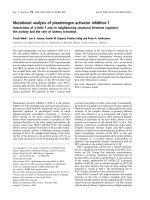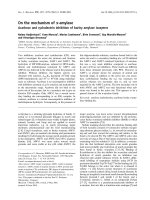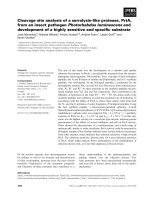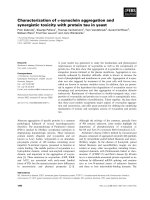Panel 6 - Rights of a Child - Bios and Abstracts
Bạn đang xem bản rút gọn của tài liệu. Xem và tải ngay bản đầy đủ của tài liệu tại đây (393.89 KB, 2 trang )
Climate Change and The Rights of a Child
Biographies and Abstracts
Friday 11 June 2021
James May is a Distinguished Professor of Law, Founder of the Global Environmental Rights Institute, and co-Founder of the Dignity Rights Project at
Widener University.
May is the President and Founder of Dignity Rights International, and a Board member of the Normandy Chair for Peace, the Earth Law Center, and
Delaware GreenWatch. He serves as the Special Representative on Harmony With Nature for the International Council of Environmental Law, and chairs
the American Bar Association Section on Environment, Energy and Resources’ Task Force on Environmental Justice. He is an inductee of the American
College of Environmental Lawyers, the Delaware Valley Environmental Inn of Court, the National Judicial College, and Phi Kappa Phi.
May has published widely in Environmental Human Rights, including Encyclopedia of Human Rights and the Environment (2020), Environmental Rights:
The Development of Standards (2019), Judicial Handbook on Environmental Constitutionalism (3d. Ed. 2019), Judicial Handbook on Environmental
Constitutionalism: Compendium of Cases (2d ed. 2019), Implementing Environmental Constitutionalism (2018), The Future of Sustainable Energy, (2016),
New Frontiers in Environmental Constitutionalism (2016), Environmental Constitutionalism (2016), Global Environmental Constitutionalism (Cambridge
2015), and Principles of Constitutional Environmental Law (2011).
He has received numerous awards and recognitions, including from the Sierra Club, American Canoe Association, and Pace University Haub School of
Law, and LawDragon as one of the world’s most influential environmental lawyers.
Briony Eales is a climate change and environmental lawyer working in the Asian Development Bank’s (ADB) Law and Policy Reform program. Briony led
research and writing for ADB’s four-part report series, Climate Change, Coming Soon to a Court Near You. The reports are comprehensive in their review of
climate law, policy, and litigation in Asia and the Pacific. They shine a spotlight on the judicial achievements so far and seek to give voice to the unique
perspectives in Asia and the Pacific. Briony has also advised a Southeast Asia government on its climate law and updated climate change strategy.
Briony previously worked in mining projects, advising on environmental and social compliance, project risk, sustainable development, resettlement, and
indigenous people’s engagement. This work allowed Briony to work directly with communities on free, prior, and informed consent, an issue relevant to
climate change and children.
Abstract:
Asian lawyers have made critical innovations in climate litigation and intergenerational justice—think Oposa v. Factoran, Leghari v. Pakistan, and the
Philippine Commission for Human Rights. Rights-based litigation has been popular across the region, and for good reason. It overcomes the heavy burden
of standing for youth public interest litigants and grants them access to courts of superior jurisdiction.
But, what’s next for climate litigation in Asia: a region that needs to start figuring out adaptation, and quickly? A recent decision from Pakistan contains
concepts that may serve the youth climate movement well. The court fused climate democracy, intergenerational justice, and being a good ancestor with
sustainable development. Climate democracy could be a pathway for children and youths to participate. But that might require pushing for recognition of the
right of children to participate and be considered in planning, something we haven’t yet seen in climate litigation.
Julia Olson is the founder, Executive Director, and Chief Legal Counsel of Our Children’s Trust (OCT), a nonprofit public interest law firm that provides
strategic, campaign-based legal services to youth from diverse backgrounds to secure their legal rights to a safe climate. Julia graduated from the University
of California, Hastings College of the Law in 1997, and founded OCT in 2010 when, as a young mother, she realized that the greatest threat to her children
and children everywhere was climate change. Julia is lead counsel in Juliana v. United States, the constitutional climate change case brought by twentyone youth against the U.S. government for violating their Fifth Amendment rights to life, liberty, property, and public trust resources.
Abstract:
Julia Olson will discuss constitutional climate lawsuits, focusing on Juliana v. United States, and the important intersection of science and constitutional law.
The landmark Juliana case was filed in 2015 by twenty-one youth against the U.S. government for its affirmative actions that cause and contribute to the
climate crisis and violate the youngest generation’s constitutional rights to life, liberty, and property .
Ramin Pejan is an attorney with the International Program at Earthjustice. Prior to coming to Earthjustice, Ramin worked for the United Nations Office of
the High Commissioner for Human Rights and the United Nations Environment Programme on the links between human rights and environmental issues,
and as Senior Counsel at the New York City Law Department’s Environmental Law Division. His practice at Earthjustice focuses on stopping dirty fossil fuel
projects and promoting clean energy. Ramin is also co-counsel in a climate change complaint brought by Greta Thunberg and fourteen other youths before
the United Nations Committee on the Rights of the Child.









